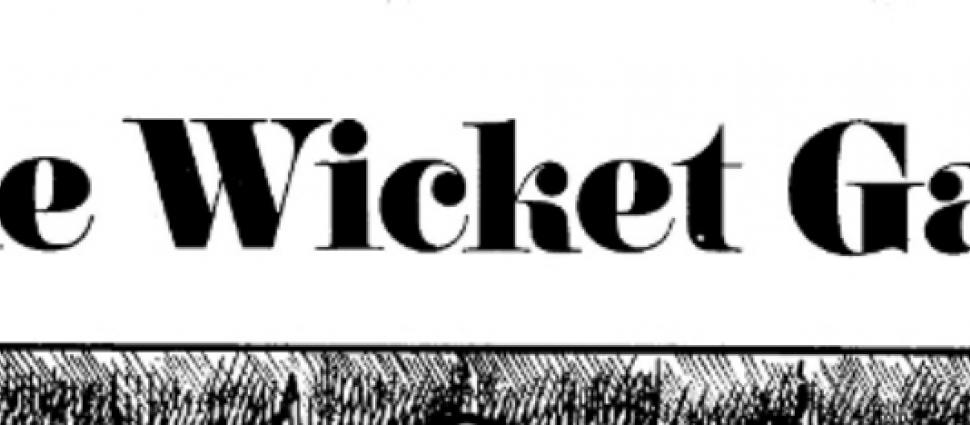Bunyan’s Wicket Gate

Jun 23, 2016
On two different occasions recently, I have read and heard Spurgeon’s story of the Scottish “fishwife” carrying a basket of fish while an eager young man challenged her about spiritual things. When he compared her “burden” of fish to Bunyan’s spiritual one in Pilgrim’s Progress, the woman claimed that she got rid of such years before. She bemoaned that Bunyan took too long to get burdened Christian to the cross for relief. In the sermon, “The Plain Man’s Pathway to Peace” (1880), Spurgeon shares the woman’s complaint:
Why, that Evangelist, when he met the man with the burden on his back, said to him, "Do you see that wicket gate?" "No," he said, "I don't." "Do you see that light?" "I think I do." "Why, man," she said, "he should not have spoken about wicket gates or lights, but he should have said, 'Do you see Jesus Christ hanging on the Cross? Look to Him and your burden will fall off your shoulders.'"
Thus, Evangelist gave bad counsel by taking him through certain experiences to prepare or qualify him to come to Christ. In this way, Bunyan was guilty of “preparationism,” the teaching that a sinner needed to be appropriately humbled and convicted of sin before we can point him to Christ for salvation.
Dr. Sinclair Ferguson relates the fishwife story in conference talks (2005) on the 18th-century Marrow Controversy and in The Whole Christ (Crossway, 2016). In setting forth the dangers of both legalism and antinomianism, both of which distort the law and grace of God in Christ, Ferguson proposes that Bunyan emits a kind of legalistic preparationism detracting from the free offer of the gospel.
Derek Thomas at the 2016 Banner of Truth Conference sought to rescue Bunyan from the fishwife charge. First, Christian’s experience was descriptive of what happened to him not prescriptive of what should happen as paralleled by Bunyan in Grace Abounding. Second, Christian’s wife, Christiana, in The Pilgrim’s Progress, Part II, had a different and easier way to the cross and so detracts from a prescriptive idea of qualification.
Spurgeon thinks that Bunyan could have been more careful, yet was right in “describing things as they generally are.” Yet, the fishwife correctly related things “as they ought to be .” So what do we make of the fishwife’s diagnosis? Well, I want to point out at least three problems with her argument.
- First, when Evangelist pointed Christian to the wicket gate, he was directing him to Christ by the light of Scripture as seen in Bunyan’s marginal note: “Christ and the way to him cannot be found without the Word,” as supported by Bunyan’s marginal citation of Matthew 7:13; Psalm 119:105; and 2 Peter 1:19. In summary, in response to Christian’s cry, “What shall I do to be saved?” (Acts 16:31), Evangelist points him to Christ.
- Second, The Pilgrim’s Progress, an allegory, does not express Bunyan’s theology as clearly as his doctrinal treatises and sermon tracts. Thus, we must interpret the unclear in the light of the clear. The marginal notes seek to do just that. Also, the allegory of a long journey easily leaves us wondering, “Why did it take so long to get to the cross?” In fact, Bunyan clearly taught sinners to seek Christ without delay. For example, in Light for Them Who Sit in Darkness (1674), he speaks against the idea of a qualified sinner: “Shall he stay from Christ till his heart is better? No. What then? Let him NOW look to Jesus Christ crucified, then shall he see his sins answered for.”
- Third, if indeed Bunyan meant to express the idea of being in Christ when one enters the gate, Christian experienced forgiveness well before he got to the cross. As many scholars attest, that Bunyan was then expressing the assurance of justification at the cross and not the experience of it. Such an interpretation is quite plausible.
Bunyan was no erudite theologian such as his contemporaries John Owen or Thomas Goodwin and could be somewhat eclectic and even inconsistent in his theology. But, he was no preparationist. So, even if he at times was not careful enough in his discussion of such, Bunyan set forth a certain kind of preparatory work as the operation of God upon sinners not as a requirement for them to perform.





